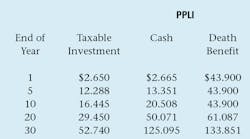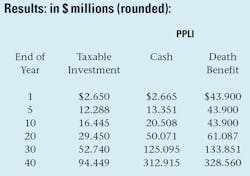"Tax-free" always has a nice ring to it. The higher the income tax rate the nicer the ring. The old top rate, at 35%, was bad enough. The current highest rate — 39.6% — has created a flurry of activity to legally avoid the tax.
But wait! There is an additional surtax that can bite you for another 3.8% on passive investment income. And there can be more: your home state may have an income tax. Some states (like Nevada and Florida) have no tax. Other states — New York at 8.82%, California at 9.3% and Hawaii (the highest) at 11% — have killer top rates.
So, if you have a large amount of investment income, your tax burden can be from a low of $42.4% to as high as 53.4%.
This gives us a worthy target to make tax-free. But how? The answer — as you will see in this article is private placement life insurance (PPLI). To start, let's see how your wealth accumulation is impacted by taxable vs. tax-free? An example is the easiest way to grasp the difference. The following example (created by Lewis Schiff, an Austin, Texas lawyer) will astound you.
Facts: A PPLI policy insurers a 45-year old male (Joe) paying $2.5 million each year in premiums for five years (a total of $12.5 million). The assumed rate of return is 10% (net of investment-management fees), taxed as ordinary income (at 40%, including Federal and State taxes).
Wow! Take a moment to study the results. If Joe lives to age 75, his "Cash Value" is $125 million vs. $52.7 million for the "Taxable Investment," and the "Death Benefit" gives you a tax-free — almost $9 million — bonus. Certainly, a worthy target.
The prime purpose of PPLI is to make your investment profits (whether capital gains, dividend income or interest income) tax-free. Simply put, all policy investments are wrapped in a tax-free insurance envelope.
Now, what is PPLI? It is a form of variable universal life insurance that is offered privately, rather than through a public offering. Variable life insurance has cash value that is dependent on the performance of one or more investment accounts in the policy.
There are an endless amount of tax magic tricks you can do with PPLI. Following are examples that can save you a huge amount of tax dollars.
Private placement variable annuity
With a PPVA investment account a wealthy client (Jim) can put after-tax dollars to work in a tax-deferred account. As long as the assets stay within the account, Jim does not recognize any income. However, if Jim withdraws any money from the account, then he recognizes taxable income.
The minimum size for a PPVA is $1 million, with many ultra-affluent families putting $100+ million into these accounts. Because the asset commitment is much higher than a retail annuity, the costs are much smaller, usually under 1% a year. If you are looking to defer more assets in addition to your traditional retirement accounts, a PPVA account makes sense.
Next, here's a smart way to use a PPVA to endow your foundation or a public charity. For example, say you have $100 million of wealth. You know, with reasonable certainty that you will never need to touch $25 million during your lifetime (you can live more than comfortably on the other $75 million). So you put $25 million in a PPVA. The money grows tax deferred.
If you need to access the money, you can do so. But if you don't touch the money, all of it will go to a charity or foundation at your death. At current tax and life expectancy assumptions and reasonable growth rates, three to four times more money will go to charity (see example at beginning of article) using your PPVA.
Private placement variable universal life insurance
With a private placement variable universal life insurance (PPLI), you put after-tax dollars to work in the form of an insurance premium. There are two components to your PPLI account — one is a tax deferred investment account. The other is an insurance benefit.
When you put money into a PPLI, one of two scenarios play out. In one, you never touch the money during your lifetime. Then, the funds grow tax-free (minus the insurance charges) and pay out income tax free at your death.
In the other scenario, you decide during your life that you want to take some money out of the policy. Simply withdraw the amount you want free of tax. If you want to access more than the policy's cost basis (i.e. the premiums paid), you can borrow at reasonable rates from the policy, also income tax-free.
With a PPLI, you're buying life insurance and must pass an insurance physical. Premium costs depend on your age and health.
Investment flexibility
In either a PPVA or a PPLI, you can, with the help of the insurance company, select from a large number of hedge funds. Or you can work with a third party advisor (whom you select). You can even switch advisors or have more than one. The insurance carrier will help guide you as to required diversification.
If you have a large investment portfolio, (whether CDs, municipal bonds, hedge funds, stocks or bonds, or any of the other endless parade of investment vehicles), a PPVA or PPLI is a smart wealth-multiplying strategy. Your wealth compounds at an accelerated pace because you won't lose one cent to income taxes.
And finally, a huge thank you to Aaron Abrahms, a partner at Winged Keel Group in New York City, for his technical advice and help in writing this column.
Irv Blackman, CPA and lawyer, is a retired partner of Blackman Kallick LLP and chairman emeritus of the New Century Bank, both in Chicago. He can be reached at 847-674-5295, e-mail [email protected], or on the Web at: WWW.TAXSECRETSOFTHEWEALTHY.COM.



